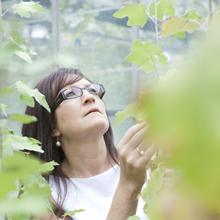Is sugar the most dangerous plant in the world?
Gail Taylor, Professor of Plant and Environmental Biology, was part of an expert panel at the Royal Botanic Gardens, Kew, debating the role of sugar in our diets and the country’s economy. Her research encompasses sustainable bioenergy as a viable alternative to fossil fuels and often involves sugar-based materials.
Topical questions discussed at the event included the influence of sugar in the growing obesity epidemic and how it may be replaced in soft drinks by artificial sweeteners, as well as sugar’s potential in green energy.
“It was fascinating to be part of such a wide-ranging debate. I hope I was able to show that rather than being seen as a dangerous plant, sugar can be part of the solution for the sustainable bioeconomy of the future,” she says.
Gail chairs the University of Southampton’s multidisciplinary Energy research group. She also works as part of the UK Energy Research Centre, and is a member of the Strategic Advisory Group for Bioenergy of the Energy Technologies Institute.
The panel at Kew was chaired by Professor Charles Godfray and included medical scientist Professor Graham MacGregor who leads Action on Sugar, Professor Julian Cooper, who has worked in the sugar industry for 35 years, Dr John Fry, an expert on artificial sweeteners and Lindsey Bagley who works in the product development industry.
